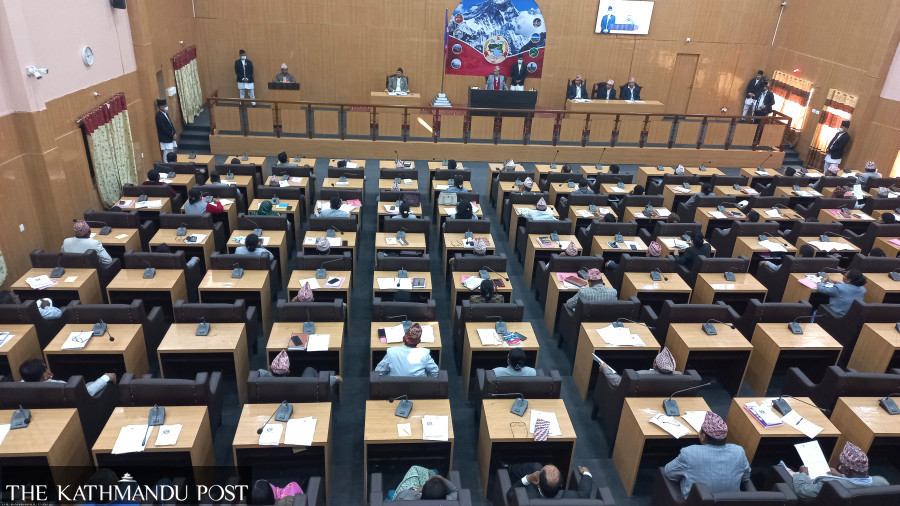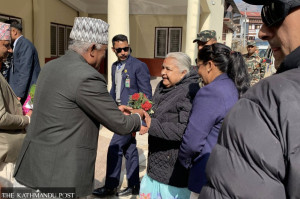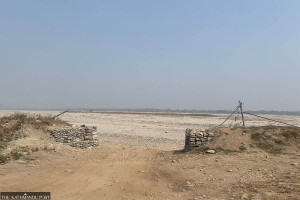Koshi Province
Koshi Head Khapung summons special provincial assembly session
UML, Maoist members demanded the session as chief minister refuses to go for floor test.
Binod Ghimire
A special session of the Koshi Provincial Assembly has been called for April 18 amid Chief Minister Kedar Karki’s reluctance to either face the assembly or to resign.
Parshuram Khapung, the province head, summoned the session at the request of more than a quarter of the assembly members as the Karki government was unwilling to do so.
Generally, the provincial assembly session is called by the province head on the government’s recommendation. But as Karki was reluctant, the CPN-UML and the CPN (Maoist Centre) members made a written request to Khapung for the special session.
Karki, who revolted within his party Nepali Congress after it decided to support Indra Bahadur Angbo of the Maoist Centre as chief minister candidate, became the chief minister with the UML’s support on October 14.
He was appointed chief minister as per Article 168(5) of the constitution under which a provincial assembly member can claim the chief ministerial position by producing the support of the majority members.
Individual assembly members, irrespective of their party’s decision, can support the candidates of their choice for the chief minister to be elected as per the Article 186 (5). As many as eight Congress provincial assembly members had stood against the party’s decision to back Angbo.
Karki garnered the support of 48 members in the provincial assembly with 93 seats.
However, the political dynamics in the province changed with the formation of a new alliance at the centre on March 4. As per the deal among the five ruling parties, the UML has been given the leadership in the province.
With 40 seats, the UML is the largest party in the assembly while the Maoist Centre has 12. Together, the two parties have more than half the seats in the assembly. As they have withdrawn their support, the Karki government is in the minority.
The two parties have been demanding that he either win a vote of trust or resign. They have also presented a claim for a coalition government.
But Karki has maintained that as he became the chief minister as per Article 168 (5), which is the last option for government formation, there is no possibility of a new government. Dismissal of his government will directly lead to the dissolution of the provincial assembly, he claims.
But not all buy his argument.
“There is a Supreme Court precedent which says the legislature cannot be dissolved as long as there is the possibility for the formation of a new government. More than 50 percent of provincial assembly members are with us, which is enough to form a new government,” Rewati Raman Bhandari, UML chief whip in Koshi, told the Post. “Karki should either resign or will be ousted.”
Issuing its verdict on February 23, 2021 in a petition against the dissolution of the House of Representatives by erstwhile prime minister KP Sharma Oli, the apex court stated that the head of government can’t dissolve the legislature “as long as the House can produce a government and an option for that remains”.
The UML and the Maoist Centre want Karki to resign. They are preparing to get a resolution motion demanding his resignation to be endorsed by the provincial assembly.
“The motion to be endorsed will show the assembly doesn’t have trust in him. If he still refuses to resign, we will wait for a month for him to seek a vote of trust,” said Bhandari. “The province chief will announce a new government if he doesn’t get a vote of trust within a month.”
The UML and the Maoist Centre withdrew their support on Monday, which marked the start of a 30-day countdown for the vote of trust.
Constitutional experts say in a parliamentary system the executive must always have the legislature’s trust. Senior advocate Dinesh Tripathi said one can not remain chief minister without ensuring majority in the provincial assembly.
“Karki either has to prove he holds a majority in the Koshi provincial assembly or resign,” he told the Post. “The assembly cannot be dissolved as long as there is a possibility of another government.”
Tripathi says the Koshi provincial assembly would have been dissolved had Karki failed to get a vote of confidence within 30 days after becoming the chief minister. Now there is no constitutional hurdle to form a government as per 168 (2), he said.
Commenting on Karki's reluctance to not to resign or face the assembly, Tripathi said, “How will his government pass the budget? And what about passing the bills?”




 18.12°C Kathmandu
18.12°C Kathmandu













